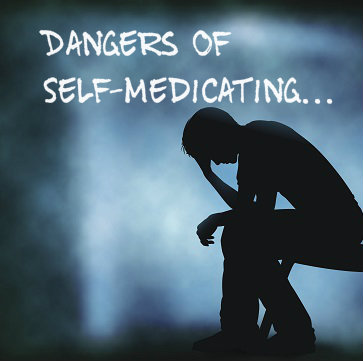What Are You Really Doing When You’re Self-Medicating Depression?
Depression can be a very serious mental health condition. People struggle with depression to varying degrees. For some it is a lifelong battle, while for others it comes on as the result of life situations but is temporary. In any type of depression, self-medication is common but ill advised. Self-medication is the use of drugs or alcohol to mitigate symptoms. It is a dangerous and destructive practice, but not everyone who does it realizes the harm they are causing. If you or someone you love struggles with depression, look out for and avoid self-medicating.
Depression And Substance Abuse
Self-medicating is particularly common for depression. It mostly occurs in people who have not been diagnosed and are not getting professional treatment for depression. If you feel depressed, it is natural to turn to something that will either make you feel better, or that will at least numb that bad feeling. Most people reach for alcohol, but prescription drugs and illegal drugs are used as well for the self-medication of depression. The rates of substance abuse among people with either depression or anxiety are as high as 20 percent.
The Dangers Of Self-Medicating
 Self-medicating feelings of depression often work in the short term. It’s why so many people resort to it as a strategy for feeling better. Over a long period of time, however, doing so only causes more problems. Not least of these problems is the possibility of addiction. A dual diagnosis of depression and addiction is not uncommon. Relying on alcohol or drugs to make you feel better is a habit that leads to dependence. Your body will get used to the substance and you will find it difficult to quit.
Self-medicating feelings of depression often work in the short term. It’s why so many people resort to it as a strategy for feeling better. Over a long period of time, however, doing so only causes more problems. Not least of these problems is the possibility of addiction. A dual diagnosis of depression and addiction is not uncommon. Relying on alcohol or drugs to make you feel better is a habit that leads to dependence. Your body will get used to the substance and you will find it difficult to quit.
Another problem with self-medicating is that it never allows you to confront and deal with your depression. Drinking or using drugs is like a quick fix, but one that doesn’t last. It is not a permanent solution to your problems. Only treatment by health care professionals using therapy in combination with appropriate medication will provide you with lasting relief. In fact, research into teenage depression has found that self-medication can actually make a mental illness more serious.
How Can I Tell If Someone Is Self-Medicating?
If you’re worried that someone you care about may be struggling with depression and is self-medicating, act immediately. Be there for your loved one and offer your help. People often don’t realize that they are depressed. It is usually easier for others to see the signs.
First look for signs of depression:
- Feelings of hopelessness or loneliness
- Apathy
- Changes in sleeping habits
- Weight loss or gain
- Irritability or irrational anger
- Difficulty concentrating
- Reckless behaviors
- Unexplained aches and pains
If, in addition to seeing these signs in someone, you also see them using drugs or alcohol frequently or to excess, he or she is probably self-medicating for depression. Your loved one may try to hide drug use or drinking, which is another clear sign. Confront this person as soon as you can, but do so in a loving and compassionate manner and offer your help.
Depression is a complex mental illness. It afflicts many people, who often turn to substances for relief. Instead of drugging the problem, get help for yourself or your loved one. The care and treatment given by professionals is the right solution to coping with and living with depression. Self-medicating may feel right initially, but the good feeling won’t last. It will only make the condition and symptoms worse.
Learn More About Dual Diagnosis
If You Or Someone You Love Is Struggling With Mental Illness and/or Addiction – Call Us Now To Speak To A Recovery Advisor! We Are Here To Help!



